
Occupy Central
Occupy Central is a civil disobedience movement which began in Hong Kong on September 28, 2014. It calls on thousands of protesters to block roads and paralyse Hong Kong's financial district if the Beijing and Hong Kong governments do not agree to implement universal suffrage for the chief executive election in 2017 and the Legislative Council elections in 2020 according to "international standards." The movement was initiated by Benny Tai Yiu-ting (戴耀廷), an associate professor of law at the University of Hong Kong, in January 2013.
OCCUPY CENTRAL - DAY 66: Full coverage of the day’s events
Hong Kong volunteers race against time to save Occupy artworks
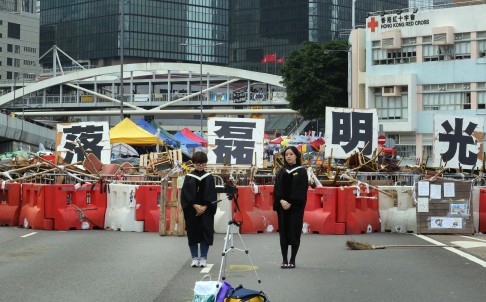
Volunteers were yesterday in a race against time to rescue scores of protest-inspired artworks ahead of a possible police clearance operation in the main Occupy site outside the government headquarters in Admiralty.
Together with works retrieved from the Mong Kok site last week, volunteers for Umbrella Movement Visual Archives and Research Collective have collected around 100 works for future research.
Clarisse Yeung of the collective said about 50 volunteers in 10 teams had arrived in Admiralty just before protesters and police clashed in Lung Wo Road early yesterday morning. "Our volunteers acted swiftly to retrieve the works. We had help from protesters on the site too. It went smoothly," said Yeung.
But it was not all peaceful as some volunteers were accused by radical protesters of wasting time on art instead of taking to the front line to battle the police.
Works collected yesterday included banners, sculptures, signage and drawings created over the past two months. They included the iconic signkwong ming lui lok, which formed part of the main barricade outside the Red Cross headquarters in Harcourt Road.
The four-character expression means upright and honourable. It was used by the police to describe their law enforcement tactics. But it became a sarcastic phrase after the incident in which seven plain-clothes policemen allegedly beat Civic Party member Ken Tsang Kin-chiu, who was also a pan-democrat member of the 1,200-strong election committee which picked Leung Chun-ying as chief executive in 2012.
The volunteers also saved a road sign reading "Road To Democracy", which was erected outside the government headquarters, and a cardboard sculpture in the form of a man covered with post-its. They also took away protest banners removed by the police.
However, a patchwork canopy made of umbrella material which was hung on a bridge across Harcourt Road remains in place as the creators from Baptist University have yet to decide its fate.
Yeung said the artist nicknamed Milk had taken back his Umbrella Man sculpture for repair.
Artist Wen Yau of the collective said last week that volunteers had managed to retrieve dozens of works in Mong Kok just before chaos broke out. They collected makeshift objects including shields made of soft padding and empty water bottles and cutouts depicting President Xi Jinping holding an umbrella. But she said they could not save everything before the bailiffs moved in to clear the sites.
The retrieved works are being kept in a "safe place" for archival purposes. Wen said there had been global interest in the art, but volunteers hoped to keep them in Hong Kong for future research purposes.
Meanwhile, an exhibition showcasing the public's participation in street art during the protests is being held at the Jockey Club Creative Arts Centre in Shek Kip Mei. The show runs until December 31.
This article appeared in the South China Morning Post print edition as Volunteers race against time to save artworks
PUBLISHED : Tuesday, 02 December, 2014, 3:48am
UPDATED : Tuesday, 02 December, 2014, 8:52am
Protesters are playing into the hands of the government
The Occupy protests appear to be entering a new phase with the police stepping up their aggression. The protesters, or at least some of them, have not helped themselves by also becoming more aggressive.
Unfortunately, the students are just playing into the hands of the government. They are allowing themselves to be portrayed as law-breaking, destabilising and selfish; while the government is increasingly able to present itself as a force for stability, rule of law, reason and "normality". As the violence becomes the focus of attention, people are losing sight of what this is supposed to be about, namely political reform. The endgame we talked about a few weeks after this all started is now coming into play.
Through its weakness, the government has come up with a winning strategy. Fearing that an aggressive attempt to clear the protesters would result in a popular backlash, the government was forced into a waiting game. This has worked to its advantage. By sitting back and doing nothing, apart from agreeing to token talks with the students, the Hong Kong government together with Beijing has successfully driven a wedge between the protesters and the general public.
People who are broadly sympathetic to the cause of political reform and who initially supported the students have been turned off by the students' lack of strategy and the disruption caused by the closure of the streets. So buoyed by the public's disinclination to offer further support to the students, the danger now is that the police appear to have literally been given a freer hand to deal with the protesters, with the result that a lot more blood is being spilt. Rather than hitting arms, legs and the body, the police seem to be hitting a lot more around the head. This will radicalise the students and undermine those that believe in peaceful protest.
There is also the likelihood that someone is going to be killed if this continues. There is no telling how people will respond to that. Meanwhile, the police gain nothing from television images showing officers on a bridge openly clapping their hands in applause as if they were at a football match, as their colleagues on the street below mounted another baton charge into the students. While this may be a symptom of the frustrations they have endured over the past couple of months, it also reflects their unfamiliarity with this kind of work.
While the government may take some comfort from being able to present itself now as a force for stability and public order, let's not forget its contribution to this mess. This includes an inability or reluctance to negotiate with the mainland over political reform, even to the point of maintaining the status quo.
This was reflected in its report on constitutional reform which it sent to Beijing earlier this year. It obviously did little to push back behind the scenes over the August 31 decision by the Standing Committee of the National People's Congress, which raised the threshold support required for those seeking to be nominated to compete in the 2017 chief executive election.
Given the mood in Hong Kong it is odd, to say the least, the authorities thought that taking Hong Kong backwards was going to ease the high levels of dissatisfaction here.
The current phase of the protest is obviously playing out badly for Hong Kong and the worry is that given the intransigence of the central government - which means there can be no political solution - this may turn out to be just round one of protracted instability.
With this cloud looming over Hong Kong, the situation does not augur well for an open economy like Hong Kong.
Have you got any stories that Lai See should know about? E-mail them to howard.winn@scmp.com
Hong Kong police thwart student plans to blockade government headquarters
Police thwart student plans to blockade government headquarters and CY's office
PUBLISHED : Tuesday, 02 December, 2014, 1:28am
The city witnessed the strongest show of force yet by Occupy protesters and police in Admiralty late on Sunday and in the early hours of yesterday.
Student leaders wanted to blockade the government headquarters and the chief executive's office. Protesters twice occupied Lung Wo Road but police in riot gear managed to eject them. The protesters ended up where they started - back in their tents.
Students had also wanted to blockade the main footbridge leading to the government headquarters to prevent civil servants from getting to work. But this plan failed after police took control of the bridge.
The overnight scuffles led to 40 people being sent to hospital and 17 police officers being injured. Forty people - 35 men and 5 women - were arrested on suspicion of unlawful assembly, possession of offensive weapons, theft and disorderly conduct in a public place.
After 12 hours, the students returned to their main protest site in Harcourt Road.
The retreat came after police began charging them outside Chief Executive Leung Chun-ying's office at 7am. Officers swept through Tamar Park, pushing the protesters back to Harcourt Road. It was all over in half an hour.
The night had begun on a high note at 9pm on Sunday, with Federation of Students representative Nathan Law Kwun-chung calling on protesters to escalate their action. Wearing hard hats, goggles and protective masks, hundreds of them headed towards the chief executive's office.
Although a police cordon on Lung Wo Road held them back outside Leung's office, the crowd grew gradually with reinforcements pouring in from the main base in Harcourt Road.
"Five, four, three, two, one, charge!" a protester shouted, before a group rushed at police.
The protesters then spilled over onto the road and occupied one section of the thoroughfare. Some moved metal barricades to block the police.
Police fired pepper spray and used batons to disperse the protesters. Some were pushed to the ground and subdued. At least one protester ended up with a bloodied face.
The standoff lasted until 1.30am when the police launched a major counteroffensive. More than 200 riot police swiftly moved in.
The protesters opened their trademark umbrellas and used wooden boards to shield themselves, but to no avail. One shot at police officers with a fire extinguisher. Others lobbed eggs, bottles and soft drink cans at the police as they fled.
The road was cleared and reopened - but only briefly. At around 3am, after most police officers had left Lung Wo Road, the protesters returned and retook the highway.
They quickly set up barriers again, using wooden boards, bricks and parts of water-filled plastic barriers they had obtained from a nearby construction site.
Calm returned for a few hours, as police and protesters, by now exhausted, retreated for a rest.
But by 7am, a new contingent of officers in riot gear appeared suddenly from the two sides of the chief executive's office and entered Lung Wo Road.
Using fire hoses to drench protesters outside the chief executive's office, the police surged forward and pushed the crowd back on to the pavements, and then to Tamar Park.
Officers chased the protesters to the park and wielded pepper spray and batons to drive them further down Harcourt Road. Some demonstrators fell or were pushed to the ground before officers tied their hands with plastic strips.
Police also removed dozens of tents which had earlier been set up by protesters. The only trace of the protesters' presence were dried patches of grass.
On their way back to the main protest site, some protesters asked the police why they needed to use such a degree of force.
One young female protester broke into tears and said to reporters and police at the scene: "Why do you treat us this way? We didn't charge at police lines." Police officers nearby walked past without saying anything.
Danny Lee, Danny Mok, Shirley Zhao, Chris Lau, Alan Yu, Ernest Kao and Lai Ying-kit
This article appeared in the South China Morning Post print edition as A long night of skirmishes with nothing to show
Occupy Central organisers heading for a split after failed escalation?
Pan-democratic lawmakers come out against student-led escalation as dissent grows over the way forward for two-month-old movement
PUBLISHED : Tuesday, 02 December, 2014, 1:28am
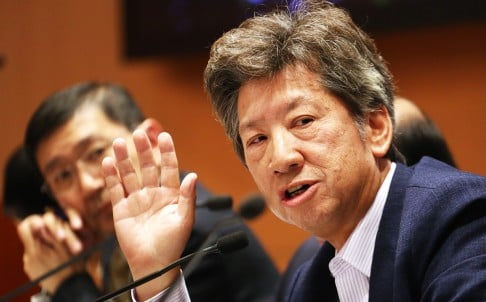
The key organising groups behind Occupy Central are edging further apart after pan-democratic lawmakers and Occupy's co-founders distanced themselves from a student-led escalation of the protests on Sunday.
For the first time since the protests began in late September, previously supportive lawmakers struck a note of dissent, with 23 of the 27 pan-democrats on the Legislative Council signing a joint statement urging student leaders not to escalate the campaign to avoid further injuries. They also condemned police "brutality".
The Occupy trio - who co-hosted the sit-in with leaders of the Federation of Students and Scholarism - have also faded from the limelight in recent days. None of the three - academics Benny Tai Yiu-ting and Dr Chan Kin-man, and the Reverend Chu Yiu-ming - were present for the attempt to blockade government headquarters on Sunday.
"Pan-democrats actually had no idea of the details of the operation," Civic Party lawmaker Ronny Tong Ka-wah said yesterday. "We only knew about the plan to besiege government headquarters via unofficial channels and media reports."
Lawmakers and the Occupy trio are said to have raised concerns at a meeting with students and other groups last week, warning that escalation was unwise with public support waning.
Sources close to Occupy revealed that the three had floated the idea of handing themselves in to police on Sunday to pre-empt the escalation. Others at the meeting persuaded them to stick to the original plan of handing themselves in this Friday.
While the lawmakers and Occupy leaders favour ending the occupation and building the campaign for democracy in the community, student leaders said on Sunday that only stepping up their actions would make the government address their demands. They also prefer to be arrested rather than surrender, which they see as a passive move.
Democratic Party lawmaker Albert Ho Chun-yan said students should "reflect deeply" on Sundays events, which saw arrests as well as injuries to both protesters and police officers moving in to prevent the blockade. Further escalation would be "meaningless and would only trigger more injuries".
Labour Party stalwart Lee Cheuk-yan, who was in Admiralty on Sunday to urge protesters to avoid violence, said the cost of escalation was too high.
"You could never beat police suppression no matter how you escalate the protest," said Lee, adding that he was saddened by the injuries and arrests. "It's time to figure out a strategy - other than escalation - to sustain the long-term fight."
While the movement had won support from young people, Lee warned that it risked losing backing in the community.
But Federation of Students secretary general Alex Chow Yong-kang brushed off talk of a split and said three of the lawmakers, including Lee, were in Admiralty on Sunday.
Meanwhile, Tong said both sit-in organisers and the government should take a step back to cool tension.
He urged the government to conduct a "holistic consultation" on democratic development. He suggested Beijing's model for the 2017 chief executive poll - in which a 1,200-strong committee dominated by Beijing loyalists would choose two or three candidates for a public vote - might be accepted if democratic elections were promised for Legco in 2020 and the top job in 2022.
Academics, meanwhile, said the escalation could backfire.
Professor Lau Siu-kai, vice-chairman of mainland think tank the Chinese Association of Hong Kong and Macau Studies, said the attempt to escalate showed that the movement was losing steam. He warned of an "authoritarian backlash" that would harm democratic development.
"The student movement in the United States in the 1960s led to the conservative backlash which culminated in the election of … Richard Nixon in 1968," he said. Nixon was known for his conservative domestic agenda.
"In the wake of the Occupy movement, Beijing realises it can't appease political opposition in Hong Kong with a moderate approach," added Lau, former head of Hong Kong's Central Policy Unit. "It will not be as tolerant as before of actions which challenge its authority."
Chinese University political scientist Dr Ma Ngok said taking the democracy movement into the community would be difficult given rising anti-Occupy sentiment in the past month.
This article appeared in the South China Morning Post print edition as Edging towards a split?
Police officers injured in morning of violence around Admiralty
PUBLISHED : Tuesday, 02 December, 2014, 1:28am
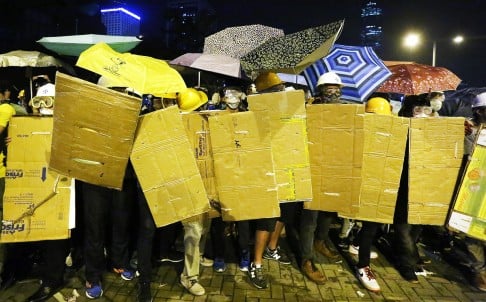
Violence flared again in Admiralty yesterday morning following an eventful night during which student-led protesters tried to storm government headquarters then twice occupied Lung Wo Road outside the offices.
At least one policeman in plain clothes was taken to hospital after he was kicked and stamped on by protesters.
Police later said four officers had been attacked near Admiralty Centre and one who lost consciousness for a time was badly injured.
The escalation in confrontations over 12 hours highlights mounting animosity between police and Occupy Central participants. In the last two months, police attacked protesters with batons and pepper spray, and were often subjected to verbal abuse.
At about 9am, both sides clashed again. The South China Morning Postcaptured the brawl.
Barely an hour had passed since police armed with pepper spray, batons and a powerful water jet finished clearing Lung Wo Road, pushing protesters back to Harcourt Road.
Shortly before the morning's mayhem broke out, the air was thick with tension as angry students exchanged taunts with officers standing on an overhead bridge on Harcourt Road.
At Admiralty Centre, protesters realised at least three plainclothes officers were standing around. When one of the officers signalled with two fingers suggesting an invitation for a fight, more than a dozen people chased the three into the building and attacked them.
The Post's video shows the scene inside the entrance on Drake Street, where a crowd of some 200 protesters and journalists have converged.
One policeman is seen lying on the ground with several protesters punching, kicking and stamping on him.
At this point, another policeman retrieves a baton from his bag to create a distance between himself and protesters.
He is encircled by protesters, while the one on the ground appears to be semi-conscious, with protesters trying to revive him.
About five minutes after the fight, police reinforcements arrived. But the sight of tactical support officers armed with helmets, shields and pepper spray charging in to rescue their colleagues only triggered more chaos.
A bottle of water was hurled at the police, who charged at the crowd, knocking people over in an attempt to secure the area.
Police arrested a 30-year-old man over the incident and were searching for another two men.
Steve Hui Chun-tak, chief superintendent of the police public relations branch, said four officers were taken to hospital with one still being treated.
Other video footage showed policemen swearing, raising their middle fingers and clapping their hands after dispersing protesters from a bridge. Joshua Wong Chi-fung, leader of student group Scholarism, said the police were "out of control".
But Hui declined to say if those incidents would be investigated. "I hope that the public will understand the difficulties in law enforcement," he said.
Police Inspectors Association chairman Henry Ngo Chi-hang told the Postthat the attack on the plainclothes officers had nothing to do with the police's relationship with civilians in general.
But he admitted many officers were "unhappy about the unreasonable insults" they had faced.
This article appeared in the South China Morning Post print edition as Police officers injured in morning of violence
Violence should never be an option for Occupy protesters
PUBLISHED : Tuesday, 02 December, 2014, 2:49am
Police officers clash with pro-democracy protesters outside Central Government Offices on November 30. Photo: Edward Wong
Violence was never meant to be part of the Occupy movement, but it has regrettably evolved that way. Clashes between protesters and police outside the government headquarters in Admiralty early yesterday were the worst since the demonstrations began 65 days ago, the result of a call by student leaders for escalation. Dozens were injured, among them an officer knocked unconscious during an especially fierce scuffle. The refusal by demonstrators to abide by the law is taking hong Kong along a dangerous course from which no good can come. Withdrawing from the streets and adopting a realistic strategy is the only viable way forward for those seeking democracy.
Student leaders driving the protests have maintained that their movement is rooted in non-violence. But their urging for supporters to gather at the main protest site in Admiralty on Sunday prepared for confrontation with police spoke otherwise. It was inevitable that there would be unrest when the call went out for the crowd to surround government buildings. Many were wearing helmets, goggles and masks and some brandished home-made shields and objects that could be thrown; it was as if they were intent on provoking trouble.
Police lines near Tamar Park and Lung Wo Road were charged and fighting broke out; more than 40 people were arrested and as many treated for injuries. Alex Chow Yong-kang, secretary-general of the Federation of Students, defended the heightening of tactics. But Occupy movement founders and pan-democrat lawmakers have been distancing themselves from the students and public opinion is firmly against continued occupation of the streets of Admiralty, Causeway Bay and Mong Kok. There is an overwhelming desire for business and traffic to return to normal.
That can only happen if demonstrators turn to the time-tested methods of peaceful lobbying and reasoned negotiation with authorities. Violence is never an option. Student leaders have only one choice: to tell supporters it is time to go home.
This article appeared in the South China Morning Post print edition as Protest violence never an option
There is no rift with Federation of Students over hunger strike, says Joshua Wong
PUBLISHED : Tuesday, 02 December, 2014, 9:04am
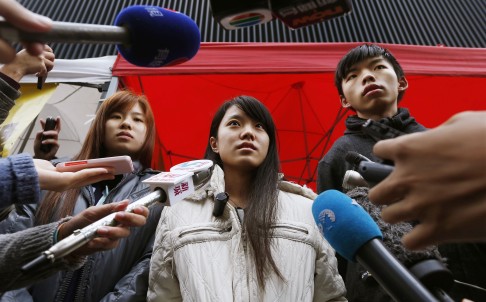
Scholarism convenor Joshua Wong Chi-fung has rejected suggestions that his hunger strike plan has caused a split with the Federation of Students.
Wong said the move was part of a two-pronged strategy and the federation was responsible for other aspects of the movement.
Asked if there was a rift, Wong said: "Of course not. You can see that our friends at the federation are mainly in charge of escalating action. As for the hunger strike, Scholarism is in charge."
Watch: Joshua Wong on hunger strike to press for political reform
Wong said his group had discussed the plan with the federation before announcing it on Monday night. But federation secretary general Alex Chow Yong-kang told Apple Daily yesterday he had not been aware of when it would be announced.
Chow told the Post his group decided not to join the hunger strike as "it may not be an effective way to pursue a dialogue with the government". They would instead preserve their energy and resources for community work. Wong said his group - which represents secondary school pupils - took on the hunger strike as the older students in the federation were better able to endure the rigours of frontline protest. "It's a division of labour," he said.
Wong made the comments hours after he announced on Monday night that three Scholarism members - himself, Prince Wong Ji-yuet and Isabella Lo Yin-wai - would begin an indefinite hunger strike.
Prince Wong, 17, who has been a Scholarism member for two years, attends International Christian Quality Music Secondary School, while Lo, 18, who has been with the group for half a year, goes to Baptist University. Joshua Wong, 18, was admitted to Open University in September.
The trio are having two check-ups per day and will drink only water - unless told otherwise by doctors, who might ask them to consume a glucose solution if their health deteriorates. The hunger strike is aimed at pressing the government to enter into further dialogue and "reboot" the political reform process.
In response, Chief Executive Leung Chun-ying urged students to take care of their health.
But Wong said: "Instead of asking us to take care of our bodies, he should have taken heed of our request to meet with officials.
"I just hope that Leung and Chief Secretary Carrie Lam Cheng Yuet-ngor, instead of expressing concern, seriously consider starting a dialogue."
The three co-founders of Occupy Central - Benny Tai Yiu-ting, Dr Chan Kin-man and the Reverend Chu Yiu-ming, who yesterday announced their plan to hand themselves in to police today - urged the students to call off their hunger strike. The students said the trio should urge the government to start a dialogue with them instead.
This article appeared in the South China Morning Post print edition as There is no rift over hunger strike: Joshua Wong
PUBLISHED : Tuesday, 02 December, 2014, 12:53pm
UPDATED : Tuesday, 02 December, 2014, 6:01pm
The government must take responsibility for ending Occupy protests
Frank Ching says being derided for lacking legitimacy does not give the government an excuse to sit on its hands about the protests
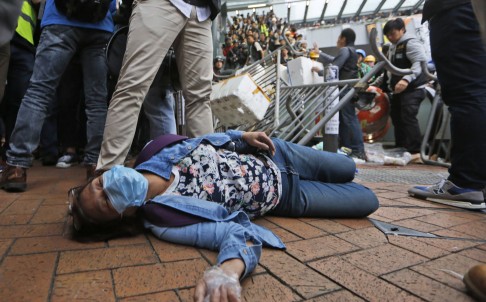
Recent, highly visible examples of police abuse of power are totally unacceptable and potentially dangerous. Without close monitoring by government ministers, there is a danger that the police may become a law unto itself.
Granted, officers have been under great strain ever since the clearance operation in Mong Kok, and they have been battling protesters almost every night into the small hours. This, of course, also makes it clear that while the slogan "Occupy Central" is still used, there is little attempt to ensure that it is done "with love and peace", as promised.
The three original organisers said that the idea was civil disobedience, with participants not resisting arrest but ready to accept the legal consequences of their actions. Now, those carrying out Occupy Central are dressed and armed for battle with the police. Yet, the founders of Occupy Central have not repudiated them. The leaders have turned into the led.
On the government side, there is a similar unwillingness to assume responsibility. The police, we are told, are professionals capable of making their own decisions. In fact, the police should have been brought in to restore order long ago but the government sat on its hands, refusing to govern. In theory, the police entered the scene last week through the circuitous route of acting as assistants to bailiffs enforcing injunctions sought by private parties.
The government, it seems, has relinquished its role of governing and turned it over to the private sector, to the judiciary, to court bailiffs and to their police assistants. Nowhere is the government seen to be exercising leadership. It is not communicating with protesters. It is not mediating with the central government regarding the desires of Hong Kong people. It is not making plans. Steve Vickers, former head of the police criminal intelligence unit and now a security risk consultant, says the government's "quasi-judicial-police approach" is "damaging to Hong Kong's future" and to the judiciary.
While it is understood in virtually all societies that political issues have to be resolved at the political level, in Hong Kong, the judiciary is being used to resolve political problems that the government itself doesn't have an appetite for. This is not separation of powers. It is the executive branch abusing the judicial branch of government. As Henry Litton, one of the original permanent Court of Final Appeal judges and today still a non-permanent judge, said in a recent speech at a law forum, "A civil court process was being invoked for what I feel is a public order issue."
This abnormal state of affairs must end. It is contrary to Hong Kong's interests for the government not to govern. It is flouting thousands of years of Chinese tradition. Confucius taught that everyone has a role in society, with the ruler acting as a ruler and officials acting like officials. When this happens, society is harmonious. Otherwise, harmony is lost.
It is high time for the government to govern again. Just because it is derided by pan-democrats as lacking legitimacy doesn't mean the government doesn't have to do its job. In fact, that should spur it to do an even better job of governing.
Frank Ching is a Hong Kong-based writer and commentator.frank.ching@gmail.com. Follow him on Twitter: @FrankChing1
This article appeared in the South China Morning Post print edition as Restore order
Recent, highly visible examples of police abuse of power are totally unacceptable and potentially dangerous. Without close monitoring by government ministers, there is a danger that the police may become a law unto itself.
Granted, officers have been under great strain ever since the clearance operation in Mong Kok, and they have been battling protesters almost every night into the small hours. This, of course, also makes it clear that while the slogan "Occupy Central" is still used, there is little attempt to ensure that it is done "with love and peace", as promised.
The three original organisers said that the idea was civil disobedience, with participants not resisting arrest but ready to accept the legal consequences of their actions. Now, those carrying out Occupy Central are dressed and armed for battle with the police. Yet, the founders of Occupy Central have not repudiated them. The leaders have turned into the led.
On the government side, there is a similar unwillingness to assume responsibility. The police, we are told, are professionals capable of making their own decisions. In fact, the police should have been brought in to restore order long ago but the government sat on its hands, refusing to govern. In theory, the police entered the scene last week through the circuitous route of acting as assistants to bailiffs enforcing injunctions sought by private parties.
The government, it seems, has relinquished its role of governing and turned it over to the private sector, to the judiciary, to court bailiffs and to their police assistants. Nowhere is the government seen to be exercising leadership. It is not communicating with protesters. It is not mediating with the central government regarding the desires of Hong Kong people. It is not making plans. Steve Vickers, former head of the police criminal intelligence unit and now a security risk consultant, says the government's "quasi-judicial-police approach" is "damaging to Hong Kong's future" and to the judiciary.
While it is understood in virtually all societies that political issues have to be resolved at the political level, in Hong Kong, the judiciary is being used to resolve political problems that the government itself doesn't have an appetite for. This is not separation of powers. It is the executive branch abusing the judicial branch of government. As Henry Litton, one of the original permanent Court of Final Appeal judges and today still a non-permanent judge, said in a recent speech at a law forum, "A civil court process was being invoked for what I feel is a public order issue."
This abnormal state of affairs must end. It is contrary to Hong Kong's interests for the government not to govern. It is flouting thousands of years of Chinese tradition. Confucius taught that everyone has a role in society, with the ruler acting as a ruler and officials acting like officials. When this happens, society is harmonious. Otherwise, harmony is lost.
It is high time for the government to govern again. Just because it is derided by pan-democrats as lacking legitimacy doesn't mean the government doesn't have to do its job. In fact, that should spur it to do an even better job of governing.
Frank Ching is a Hong Kong-based writer and commentator.frank.ching@gmail.com. Follow him on Twitter: @FrankChing1
This article appeared in the South China Morning Post print edition as Restore order
Why populist democracy is wrong for Hong Kong
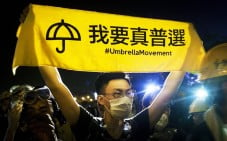
Liberal democracy and populist democracy differ primarily in their conception of liberty. In a liberal democracy, liberty is freedom from constraint in one’s activities, especially constraint by government. In a populist democracy, liberty is the realisation of the “general will” through participation in democratic political processes.
Occupy co-founders urge students to go home as they vow to surrender to police
As Occupy co-founders surrender with plea for protests to end, source reveals existence of long list of suspects for further investigation
PUBLISHED : Tuesday, 02 December, 2014, 3:26pm
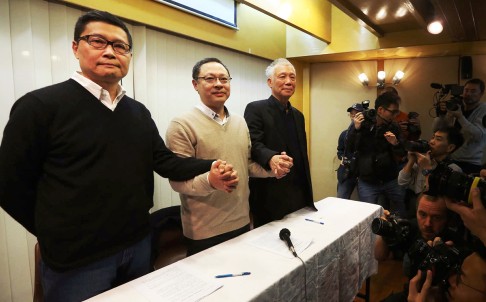
The three co-founders of Occupy Central will hand themselves in to police, as a police source revealed that more than 200 people had been identified for investigation over the civil disobedience movement.
The Reverend Chu Yiu-ming and academics Benny Tai Yiu-ting and Dr Chan Kin-man plan to report to Central Police Station at 3pm in an attempt to bring a peaceful end to the protests. They also made an open appeal to student-led protesters to retreat.
They will be joined by dozens of Occupy supporters, including Cardinal Joseph Zen Ze-kiun. Media tycoon Jimmy Lai Chee-ying and Democratic Party Founder Martin Lee Chu-ming will wait for the protests to end before surrendering.
Watch: Hong Kong's Occupy co-founders to 'surrender', urge students to retreat
Student leaders have ruled out surrendering yet, though Federation of Students leader Alex Chow Yong-kang said last night it was "only a matter of time" before they gave themselves up. The federation would discuss with protesters how to end the campaign, he added.
Meanwhile a police source revealed that the Occupy trio were on a list for investigation, along with more than 200 others. They include people who clashed with officers during attempts to clear protest camps and people who had incited others to act illegally.
No action had been taken so far because the focus was on clearing the remaining protest camps, the source added.
The Occupy trio made their announcement two days after student leaders escalated the protests with an attempt to blockade government headquarters in Admiralty. The effort was beaten back by police in an operation that saw dozens of arrests and injuries on both sides. The escalation is thought to have forced the trio to bring their plan to surrender forward by two days.
"Our young people have used their bodies to withstand the blows of police batons, their blood and broken bones have brought us the deepest sorrow," Tai said as he read the trio's open letter. "For the sake of the occupiers' safety … we three urge the students to retreat."
Chan said he did not agree that the movement had failed or that its tactics had been naïve.
"If we were naïve, it would be in our naïve beliefs towards 'one country, two systems' and the government's conscience," he said. "It is the government - which refuses to answer."
Chu, a 70-year-old veteran activist, held back tears as he touched on police use of batons, pepper spray and tear gas in an attempt to disperse protesters.
Chan added that Occupy had liaised with the Democratic Development Network, which had pledged to provide subsidies for individuals or groups who intend to promote education on democracy.
"I was very clear about my duty from day one - to lead all participants home safely," said Chu, adding that the protest had veered from its theme of "love and peace" and "we could no longer protect everyone".
Tai dismissed the idea that the three were abandoning those still on the streets of Admiralty and Causeway Bay.
"Our call is out of love to the occupiers," he said, adding that he hoped students would help take the spirit of the "umbrella movement" into the community.
Secretary for security Lai Tung-kwok welcomed the trio's decision and said police would act in accordance with procedures in handling the case.
This article appeared in the South China Morning Post print edition as Police identify 200 for probe
Occupy trio's surrender begs the question: how severely should they be punished?
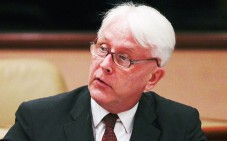
As the trio who came up with the Occupy Central civil disobedience idea turn themselves in to the police today, legal eagles differ over the severity of their likely punishment.
Hong Kong Occupy 'leaders' set for another show by turning themselves in to police
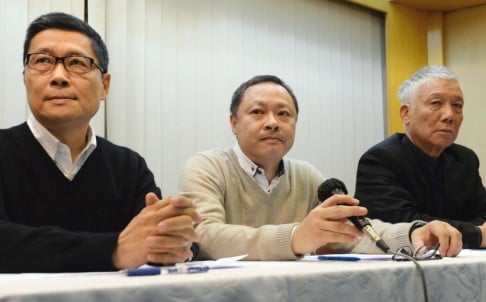
Last year, which now seems a lifetime away, I had a long lunch with Benny Tai Yiu-ting. Something about the guy made me like - even respect - him. He was modest but clever, and absolutely convinced he was on the right (and righteous) path. Occupy Central was still a theoretical plan he had concocted and was then generating city-wide debate. He had all the steps and plans neatly thought out.
His partners-in-crime, Dr Chan Kin-man and the Reverend Chu Yiu-ming, would later join him to kick-start the movement. If they only knew that the best-laid war plans would get thrown out of the window the minute the first shot was fired in battle...
It's almost tragic the trio - a legal academic, a sociologist and a pastor - who will finally turn themselves in to police today after dithering for weeks, have so much religious faith - all three are devout Christians - yet know so little about politics and political organisation. So they never managed to get ahead of the movement they helped inspire.
They were left behind by developments on the ground from day one - starting in late September when students boycotted classes. Activists then decided to occupy Mong Kok, Admiralty and Causeway Bay - anywhere but Central. The waves of protest were truly spontaneous. And peaceful or not, they had no time for Tai's theoretical plan about how the protest movement should unfold. The man at the centre of political debate for almost two years suddenly became almost irrelevant. Despite his faith in the virtue of the masses, democracy still needs real leaders.
So in an absurd and pitiful way, these three well-meaning men have been left to fight for democracy by holding press conferences. They shaved their heads before the camera. Now that their locks have grown back, they announced yesterday, yet again, that they would turn themselves in.
But what crime have they committed when they were barely involved in the protests and clashes with police? The three told their followers to come along at exactly 3pm today for the long-awaited occasion. The delusional and unhinged Catholic Cardinal Joseph Zen Ze-kiun will join the three Occupy activists. It promises to be another media circus, full of sound and fury, signifying nothing.
This article appeared in the South China Morning Post print edition as Occupy 'leaders' set for another show
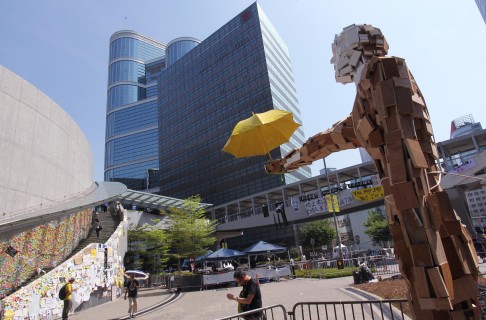

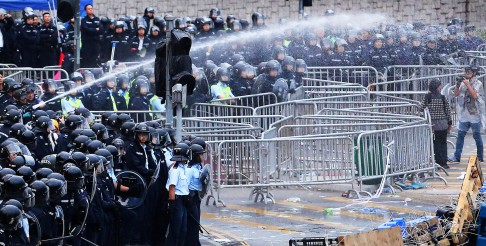

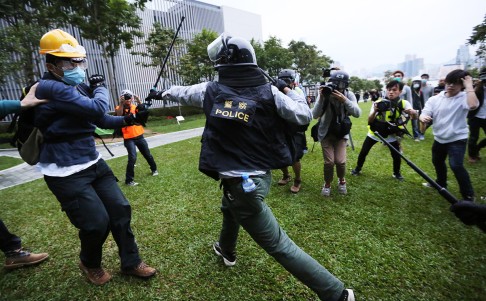



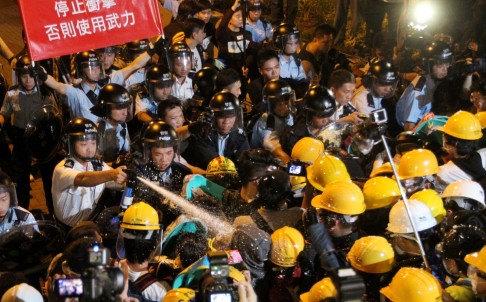
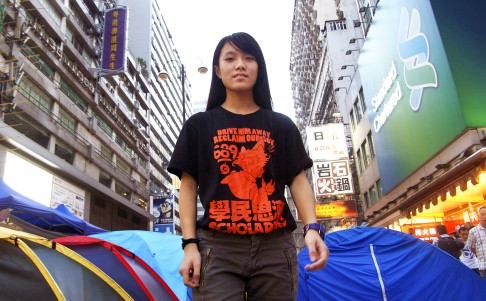

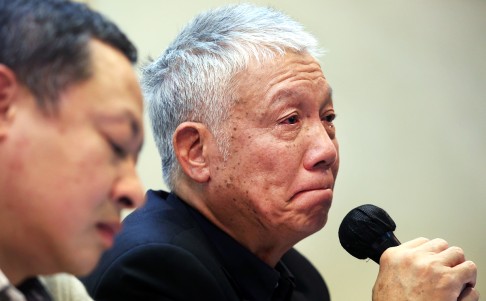

沒有留言:
張貼留言